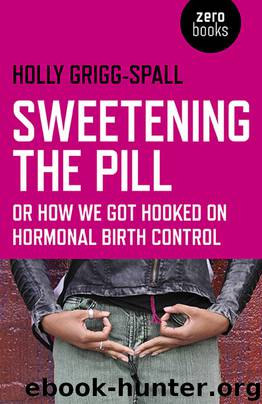Sweetening the Pill: or How We Got Hooked on Hormonal Birth Control by Grigg-Spall Holly

Author:Grigg-Spall, Holly [Grigg-Spall, Holly]
Language: eng
Format: epub
ISBN: 978-1-78099-608-0
Publisher: John Hunt (NBN)
Published: 2013-09-26T16:00:00+00:00
Beyond female
In order for us to be able to honestly and openly discuss that the pill negatively impacts women it must be acknowledged that female biology is important. Such a discussion cannot avoid the claim that female bodies are different from male bodies. By arguing that a drug changes female biology and negatively impacts mood specifically, it must be admitted that our experience of life is connected to our biology. It is necessarily claimed that who we are is linked to our biology. To say that the ovulatory cycle, a specifically female bodily system, can not be shut down and ignored without serious repercussion, because it is vitally important to women’s health is to run the risk of inciting the furor of those who feel they have fought long and hard to wrestle down and defeat the connection between women and their bodies. Such statements are controversial. Even using the word ‘female’ can be contentious today.
Bobel discusses in her work the idea of “smashing the binary.” To her, this means doing away with the concepts of man and woman. The radical menstruation activists she interviews use the term “menstruators” in place of “women.” In response Bobel asks how useful is the act of breaking down these gender boundaries when there is still so much discrimination faced by women just for being “women”?
She wonders whether it helps to say male and female are social constructs and go from there or whether, seeing as we do not yet live in a post-gender world, by doing this we are making too much of a leap and leaving a necessary struggle, and many women, behind.
In regards to the pill, we need to talk about “women” and “femaleness” because this is integral to how and why the pill came to exist and why it is still taken by so many women.
To say that the pill can change the way a woman feels by meddling with her biology reads as anti-feminist. It is also antifeminist to not take women at their word and validate their personal experience by acknowledging it to be right and true.
Taking the pill might be seen as an act of trying to get beyond femaleness. As femaleness in our culture is understood in the negative, escaping its confines is good and progressive. Any dislike we develop of being female and of having a female body is rooted in the history of female bodies being seen as problematic and in need of male control.
In a televised advert for the brand a group of women, shown singularly one after the other, asks ‘Who says you have to have twelve periods a year?’ This defiant statement ‘Who says?’ is repeated a number of times. The authority that is being questioned here is unclear; as Kissling highlights it could be other women, men, the pharmaceutical industry, feminists, or even “your mother.” The advert however suggests these women are rebelling against an authority by choosing Seasonique. These women are overcoming their biology and as such their femaleness.
This drug is not just birth control; it is, as a Yaz tagline once explained “beyond birth control.
Download
This site does not store any files on its server. We only index and link to content provided by other sites. Please contact the content providers to delete copyright contents if any and email us, we'll remove relevant links or contents immediately.
| General | Men's Sexual Health |
| Women's Sexual Health |
Come as You Are by Emily Nagoski(4467)
The Evolution of Beauty by Richard O. Prum(2997)
The Clitoral Truth: The Secret World at Your Fingertips by Rebecca Chalker(2720)
The Happy Hooker by Xaviera Hollander(2694)
The Psychology of Human Sexuality by Lehmiller Justin J(2593)
The Book of Questions: Revised and Updated by Gregory Stock Ph.d(2572)
Women on Top by Nancy Friday(2562)
The Modern Alpha Male: Authentic Principles to Become the Man You Were Born to Be: Attract Women, Win Friends, Increase Confidence, Gain Charisma, Master Leadership, and Dominate Life - Dating Advice by Patrick King(2353)
The Ultimate Guide to Anal Sex for Women by Tristan Taormino(2298)
The Coregasm Workout by Debby Herbenick(2272)
She-ology by Sherry A. Ross MD(2165)
101 Nights of Great Sex by Laura Corn(2079)
The Hite Report on Shere Hite by Shere Hite(2065)
The Ultimate Guide to Fellatio by Violet Blue(1949)
The Alchemy of Sexual Energy by Mantak Chia(1860)
A Round-Heeled Woman by Jane Juska(1845)
Orgasm mini book by Susan Bakos(1823)
The Penis Book by Aaron Spitz(1786)
Just Life & Love by A.E. Jones(1753)
